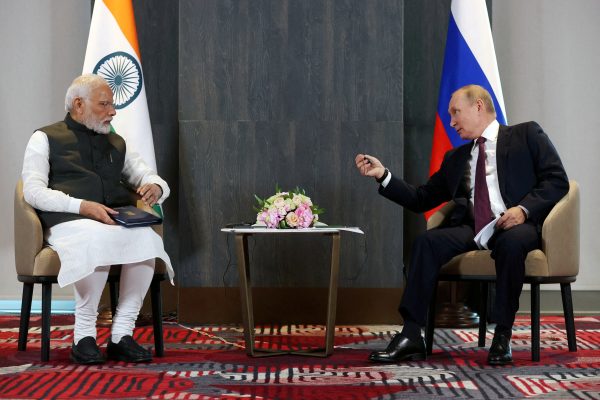Under Prime Minister Narendra Modi, India aims to become a leading power able to shape international order. Achieving this ambition involves placing atma-nirbhar (strategic autonomy) as the first pillar of Indian diplomacy.
Strategic autonomy is the ability of a state to pursue its national interests and adopt its preferred foreign policy without being unduly constrained by other states. Such autonomy is most easily achievable in a multipolar international system where several great powers can be played off against each other. Unsurprisingly, the second pillar of Indian diplomacy is its ‘multipolar focus’.
But manoeuvring in the contemporary international system requires considerable strategic flexibility. India has needed to adopt a short-term approach rather than basing decisions on enduring values. India’s foreign policy and strategic orientation has shifted to an expedient pragmatism. India’s Minister of External Affairs, Subrahmanyam Jaishankar, sees this as a policy of ‘exploiting opportunities’.
The turn towards strategic flexibility drives India towards preferring strategic partnerships over formal alliances and seeking multiple alignments rather than committing to particular allies. Indian foreign policy may appear unpredictable and perplexing. In the United Nations and other multilateral forums, India frequently aligns with Russia and China, appearing as part of their bloc rather than a member of the Quad. India considers this to be the lowest cost way to publicly demonstrate at least some strategic autonomy and that such actions will not cause irreparable damage to relationships with others — that they will understand.
India’s strategic autonomy can be constrained by practical matters, as its relationship with Russia highlights. Its reliance on Russia for logistical support for its armed forces means that India is dependent on Russian goodwill for the foreseeable future. India has tried to become self-sufficient in military technology and to diversify its foreign arms purchases but Russia remains its key provider, as highlighted by India’s leasing of two Russian nuclear submarines in 2019.
Such constraints extend into India’s strategic thinking as the Russian military remains esteemed. This includes misguided tropes such as the West must address ‘Russian sensitivities’ and Ukraine is responsible for Russian bombing of civilians. India also values its participation in Russian military exercises. As a result, India is entrapped in Russia’s decline for fear of abandonment.
Australia’s security relationship with the United States — built on a strong expectation of reciprocity — is a sharp contrast to India’s strategic thinking. Australia assiduously promotes the concept of mutual obligation — each party should support the other because they have done so previously. The most recent Australian Defence White Paper sees the Australia–NATO relationship growing ‘on the basis of reciprocity’. This notion of building locked-in, reliable support over time is fundamentally different to India’s issue-by-issue approach.
India’s focus on strategic autonomy and great power multipolarity means India has little regard for of how smaller nations play the geostrategic game. This diplomatic shortcoming is created and reinforced by India being a nuclear weapon state and having the world’s largest population. This makes joining others in collective endeavours or compromising during complicated negotiations over difficult issues unattractive. It’s not surprising that India is not part of any regional economic architecture or formal alliance in the Asia Pacific.
Compared to India, many developed nations are relatively small in terms of population and economic power, and accordingly emphasise multilateral economic and security agreements. In the European Union, for example, some two-thirds of the countries have a population of only 10 million or less. Working collectively is common for many states but not for India. Jaishankar sees ‘leveraging others [as] central to success’, not working with them.
India’s emphasis on autonomy also complicates its ability to appreciate habits of cooperation which are developed within longstanding multilateral structures. Australians can be surprised by both the inability and unwillingness of the Indian Armed Forces — when participating in military activities outside of tightly-choreographed Quad-associated training exercises — to seamlessly integrate with US coalition-led operational protocols and procedures.
India’s actions concerning defence and security matters beyond the Quad are likely to continue to disappoint. India’s treasured policy flexibility appears to emphasise the short-term while excluding consideration of the longer-term impact of its actions and behaviours. Being deliberately inconsistent may suggest India lacks principles or values, or that it is simply opportunistic.
Indian policymakers appear unconcerned that placing short-term self-interest over other considerations may mean others may act similarly when India would prefer international support. The implications of this approach became evident in September 2022 when the United States announced a major arms sale to Pakistan. India’s Defence and Foreign Ministers both voiced concerns. But in many respects, it was not dissimilar to India’s own strategic autonomy approach.
India may change, but that will take time. Until then, Michael Wesley’s advice appears apposite for relations with India concerning issues beyond the Quad: ‘Great powers, whatever their politics, are selfish, solipsistic and capricious. Other states must learn to live with them on these terms’.
Peter Layton is a Visiting Fellow at the Griffith Asia Institute, Griffith University and an Associate Fellow at the Royal United Services Institute, London.

